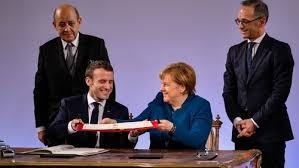New Franco-German treaty paving the way for further European integration
More than half a century after the signing of the Élysée Treaty on January 22, 1963 by German Federal Chancellor Konrad Adenauer and General Charles De Gaulle, a new Franco-German Treaty has been signed on January 22, 2019 by Federal Chancellor Angela Merkel and President Emmanuel Macron in Aachen. In 1963, the focus was on promoting reconciliation and fostering encounters – which at that time were by no means a matter to be taken for granted. Ending rivalries and conflicts that had lasted for hundreds of years, Germany and France signalled that they were seeking reconciliation. They thereby laid the foundation for close bilateral cooperation and further European integration. French President Emmanuel Macron and German Federal Chancellor Angela Merkel are picking up where the first agreement leaves off, by now taking our partnership to the next level. The new Treaty is on an equal footing with the Élysée Treaty of 1963. Instead of replacing the Élysée Treaty of 1963, the new Treaty is building on it. It sets out a modern and forward looking basis for even closer cooperation between France and Germany. The main aim of the new Treaty is to create a secure future for citizens and to draw them closer together. Cooperation is being brought up to date – also with regard to Europe, preserving our values-based multilateral order and adapting to change in our societies. The main areas of activity are culture, education, science, cross-border cooperation and innovation. The relations between Germans and French for centuries had been characterized by wars and mistrust. At the end of World War II, in a Europe devastated, ruined and literally torn apart, the foundations of the “Franco-German couple” were laid on 9 May 1950, by the French Foreign Minister Robert Schuman. He proposed to create a European Coal and Steel Community whose members would pool coal and steel production in order to prevent further wars. The European Coal and Steel Community, with its founding members France, West Germany, Italy, the Netherlands, Belgium and Luxembourg was the first of a series of European institutions that would develop into the European Union as we know it today. Until today, we celebrate the 9th of May as Europe Day. Today, the international order appears to be growing more fragile, and the multilateral system is coming under increasing pressure. Much of Europe’s neighbourhood is marked by conflict and instability. Although the globalized world and the rapid pace of technological progress do present opportunities, our societies must also undergo difficult transformations so that we can have a secure future. We can only master these challenges by acting together, as Europeans and in close cooperation with Europe’s neighbours. For this to suc acting together, as Europeans and in close cooperation with Europe’s neighbours. For this to succeed, all member states of the European Union must be part of the effort and partnerships with neighbouring regions, such as with the member states of the Arab League, must be established. The underlying principle is that cooperation between Germany and France is never meant to exclude others, but rather remains open for all European Union member states, fosters cooperation with neighbouring regions and serves as a model of how cooperation can replace conflict. ENDING INTOLERANCE AND POPULISM The reconciliation between France and Germany has led to a change in attitude of our citizens and encouraged openness towards the culture of the neighbour. Civil society has been involved in this cooperation since 1963 with the creation of the Franco-German Youth Office, which up to now has enabled nearly 9 million young Europeans to explore French and German cultures. The deep friendship between our two countries is reaffirmed on a daily basis, and is strengthened by the will to work together for a better response to the challenges that Europe is facing. Each generation must renew its understanding of this friendship, which is why youth is so important in this cooperation. Encouraging exchanges involves learning French or German - 1 million pupils in France are studying German and more than 1.5 million pupils in Germany are studying French as part of their school curriculum. This linguistic exchange is enhanced by the programmes of cultural institutes such as the Goethe Institutes in France and the French Institutes in Germany. A cultural network has been created with 4,300 twinnings of institutions and university cooperation such as the Erasmus program. This mobility program created in 1987 allows more than 80,000 students per year to experience student life in the neighbouring country. AN UNLIKELY OUTCOME TO HISTORY A practical example of Franco-German cooperation is present not far from here, in Kuwait, where our embassies are co-located in the same building. In Bahrain we celebrated the 55th anniversary of the Elysée Treaty in January 2018 together and paid joint visits to Bahraini Human Rights Institutions. These symbolic manifestations of the links between Germany and France attest the will to continue our efforts for an ever-strengthened integration. France and Germany are co-chairing the United Nations Security Council this March and April. France (Ambassador François Delattre) and Germany (Ambassador Christoph Heusgen) made use of the alphabetical order of the member States to launch a co-presidency for these two months, deepening our cooperation in an unprecedented approach of close coordination in the respect of each other’s identity, attesting the will to defend multilateralism and European values. Looking back on the history of Germany and France this seems like an unlikely outcome. We hope that it can inspire others who today find themselves in constellations of entrenched conflict with their neighbours in the many conflict zones afflicting the world in these days.
Related Posts

